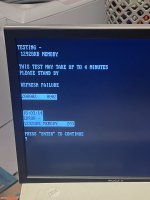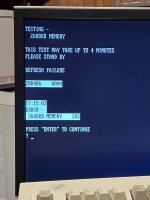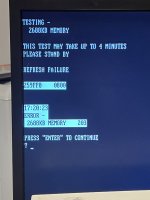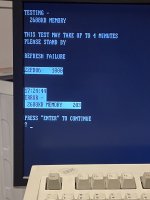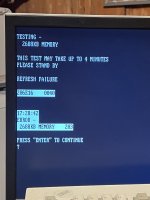I'm trying to decipher this error message when running advanced diagnostics:
Which is the case:
* Your IBM 5170 was running fine, then all of a sudden, developed a problem.
* You are in the process of modifying the configuration of your IBM 5170.
If the latter, that increases the range of possibilities. (Incompatibility, conflict, misconfiguration, etc.)
REFRESH FAILURE
200002 0002
200000 = address 2 MB
0002 = bit 1
Presumably, you only have one card that provides RAM above the 1 MB address mark, that being the EMEA, the card described at [
here].
The fact that only one bit is shown in error highly suggests a faulty SIMM.
error -
12928KB MEMORY 203
A second error, or somehow tied in with the first !
Again, above the 1 MB address mark.
203 is listed at [
here] as a "Memory Address Error".
What module on the EMEA could it be?
I could not see anything in the 'Hardware Maintenance Service' manual for the IBM 5170.
Hopefully, the problem cause is a SIMM, and not the card circuitry.
Worth a try. If you haven't already:
1. Re-seat the EMEA in its ISA slot.
2. On the EMEA, re-seat all of the SIMM's.
The EMEA does not need to be fully SIMM populated, and so, and so if we presume a faulty SIMM, a strategy becomes something like:
1. Have the minimum amount of SIMM's in the EMEA, which according to what I am reading, is two, in the upper most slots. (You should confirm that.)
2. Run the diagnostic.
3. LOOP: If the diagnostic reports no error, add two more SIMM's. If an error is indicated, maybe one of the two SIMM's just added is the problem cause.

